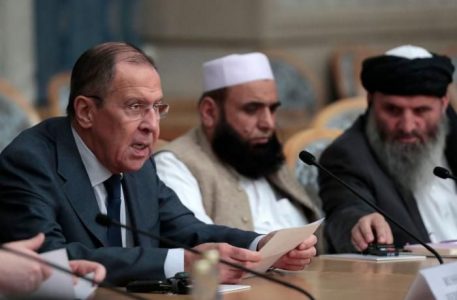
Russia talks with Taliban for control of opium and trade routes in Central Asia
In recent days a series of official talks have been held in the Russian capital to seek a peaceful solution to the situation in Afghanistan, with the participation of representatives of the Taliban movement (which in reality are outlawed in the Russian Federation). This was the third visit of the Taliban delegation to Moscow; the previous rounds of negotiations were held in February and November 2018.
In the delegation that arrived in Moscow, there were no representatives of the legitimate authority of Afghanistan, since the Taliban did not agree to negotiate with them. However, the presence of General Atto Muhammadi Nour, leader of the Afghan government in the delegation, suggests that the level of dialogue is quite high.
Russian Foreign Minister, Sergej Lavrov, took part in the negotiation process and expressed Russia’s position that all foreign troops should be withdrawn from Afghanistan. Russian interests coincide perfectly with the desire of the Taliban, who said that the negotiations with the United States in Qatar concern the timing of the possible withdrawal of US troops from Afghanistan. The Taliban hope to reach a medium-term agreement.
It is very advantageous for Russia to maintain a direct dialogue with the Taliban, since they are the main challengers to the international terrorist organization of ISIS (also banned in the Russian Federation), leading bitter battles against them in Afghanistan. For example, in 2018, the Taliban conducted a radical offensive, following which they announced the complete destruction of the ISIS enclave in the north of the country, although some terrorists managed to escape thanks to the American military.
The Taliban are also actively fighting the drug industry, which is of great concern to the Russian side, being the most sought-after market by traffickers. In 2000, the Taliban imposed a ban on the cultivation of opium poppies, from which heroin is produced. As a result, in the territories controlled by the Taliban, poppy cultivation has practically ceased and the global sale of heroin has decreased by 65%. In turn, after the fall of the Taliban regime in Afghanistan, opium production increased dramatically. All these mutual interests led to Moscow’s direct dialogue with the Taliban.
Not long ago, after fighting with Afghan government forces, the Taliban occupied the district of Argandzh-Khwa, located in the northern province of Badakhshan, near the border with Tajikistan. Thus the Afghan civil war approached the border with the Central Asian republics. A number of areas on the Tajikistan-Afghanistan border, such as Badakhshan and Kunduz, have been controlled by militants for more than a year. In addition, the Taliban have reached up to the province of Bairah in Hairaton, almost near the border with Uzbekistan.
Thus, the republics bordering on Afghanistan face a new reality, when the adjacent territory is not controlled by government forces, but by the Taliban, recognized in many countries as a terrorist organization. The concentration of militants on the border with Turkmenistan is explained by the imminent completion of the construction of the main gas pipeline through which the Turkmen gas will cross Afghanistan through the “Turkmenistan – Afghanistan – Pakistan – India” route.
The Taliban intend to occupy a plot of land along which a gas pipe was laid. Therefore, they expect to receive financial dividends from these territories, and now they are creating the bases for a long stay in the territories adjacent to the pipeline. Government forces cannot fully guarantee the safety of this project from any kind of threat, including the attack by local tribes and Isis. They do not have the strength and the means to do so, unlike the Taliban, who could very well take on this task.
Uzbekistan is also trying to establish a direct dialogue with the Taliban, which led the Uzbek leadership to meet a delegation in Tashkent. Last year, the Taliban delegations visited Tashkent at least twice and this year the representatives of the Ministry of Foreign Affairs of Uzbekistan met with them in Qatar, in Doha. Uzbekistan is negotiating with the Taliban on security guarantees for Uzbekistan’s projects in Afghanistan, in particular on the Termez-Mazar-i-Sharif railway. It is planned to extend this route to Herat and Kabul, and in the future to reach Pakistan and Iran, creating a path that connects the industries of Russia and Kazakhstan with the markets on the coast of the Indian Ocean.
Tajikistan is in the most endangered area of all the other Central Asian republics. A number of important drug trafficking routes pass through the Tajik territory, which exacerbates all existing problems. Dushanbe is making many efforts to normalize the situation on its own borders, but so far it has refrained from direct negotiations with the Taliban, leaving Russia to take the initiative. If a general conflict were to break out, caused by drug trafficking, it would be Russia to suffer the most devastating consequences.
Source: Asia News





